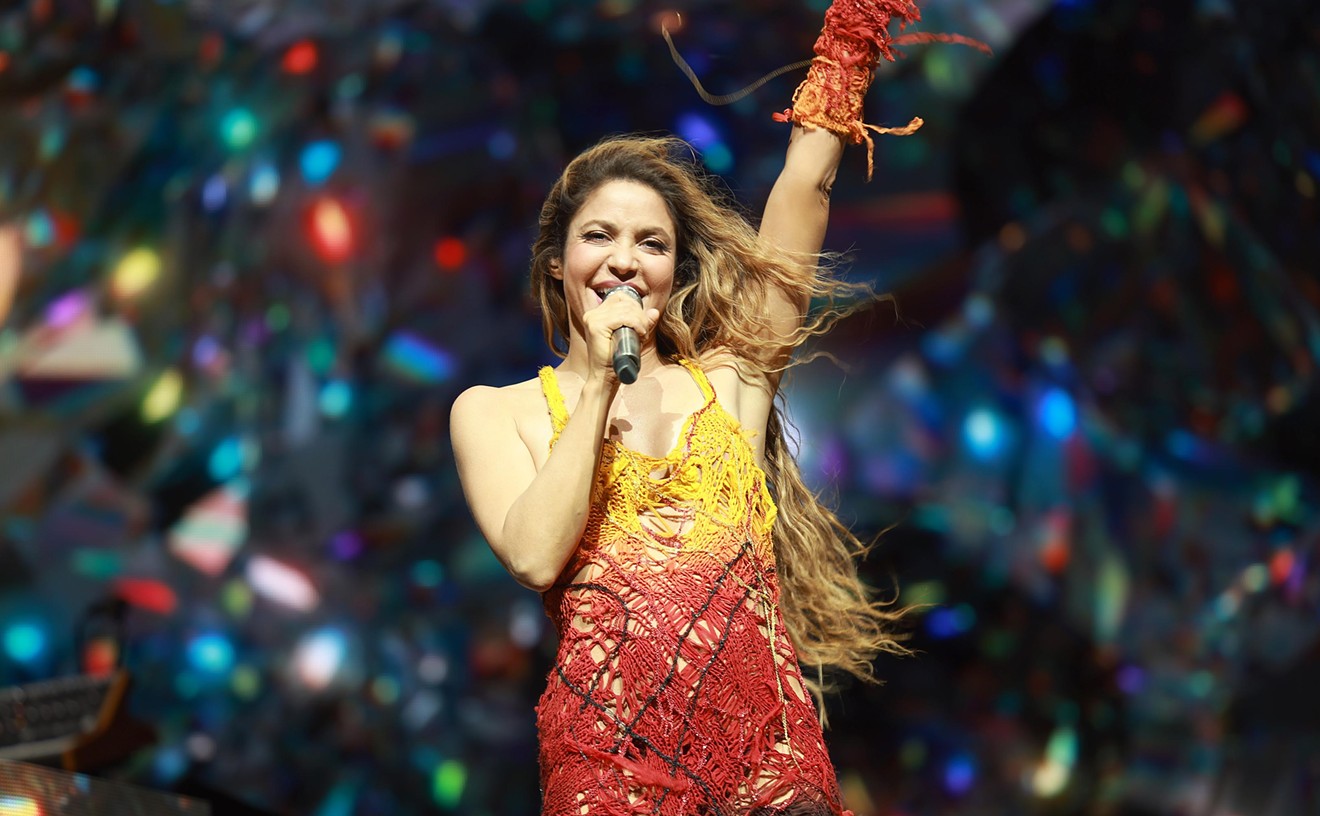“It’s a ridiculous hour,” Villavert says, “but it helps jumpstart my morning and puts me in a healthier mental state.”
For Villavert, 26, exercise is indispensable. Usually, she works out before her 8 a.m. arrival at Nature’s Plate, the plant-based food store in Lake Highlands where she cooks and preps vegan meals. But if she’s playing a Sealion show at night, she’ll try to squeeze in an early evening session.
Recently, she started the group-fitness program Camp Gladiator because one of her Nature’s Plate shift managers is a trainer. “It’s been my savior as of late,” she says.
In person, Villavert is tiny and unassuming. She carries a notebook and pen in her bag in case songwriting inspiration strikes. One of her goals for 2018, she says, is to finish her first solo EP.
“It’s something that I haven’t been very vocal about, and everyone’s first impression of me is punk rock,” she says, referring to Sealion’s aggressive, surf punk style. “Little do they know …"
From an early age, Villavert was drawn to “really strong female vocalists” like Minnie Riperton and Anita Baker. As a teen, she discovered Tori Amos and Fiona Apple and decided she wanted to play piano like the former and write raw, kick-you-in-the-face lyrics like the latter.
Lately, she's been loving Solange, whom she saw perform in Marfa last year. (“It was magical," she says.) But Villavert’s earliest and most profound musical influence was Janet Jackson. Her genre-bending 1993 album, janet., flipped a switch inside Villavert that hasn’t turned off since.
“She did new jack swing, R&B, funk, soul, rock, and everything just melded together so well,” Villavert says. "I thought, ‘How can you flawlessly do that?’ and ‘I want to do that.’”
However, Villavert’s more conservative and traditional parents, who immigrated to Euless from the Philippines about a year before Villavert's older sister was born, had other plans.
“They wanted me to focus on my studies, which I totally understand,” she says. “Of course they didn’t expect their youngest daughter to join a punk band; they were really surprised when they found out.”"I'd never heard music like that, ever. I was fresh out of high school, and I thought, 'They're way too cool to want to be my friends.'" — Sam Villavert on the first time she heard Sealion
tweet this
Villavert surprised herself, too. Before joining Sealion, she barely listened to punk music. Her sister, who is three years older, exposed her to early aughts indie rock — Eisley, Cursive, At the Drive In and the Yeah Yeah Yeahs — although Villavert’s personal tastes tilted more toward R&B, funk and "female singer-songwriter stuff."
She learned to play piano and guitar by ear and was classically trained on clarinet, but she had only dabbled in bass. She and Ansley Dougherty (now the vocalist for the Fort Worth rock trio Panic Volcanic) were playing dreamy indie folk music together as the Mind Twins when they caught Sealion playing its second show, in 2011 at the DIY musical festival Novemberfest in Romney.
“I’d never heard music like that, ever,” Villavert says. “I was fresh out of high school, and I thought, ‘They’re way too cool to want to be my friends.’”
About two years later, Villavert got a text from Sealion vocalist and guitarist Hunter Moehring asking if she’d like to audition to be the band’s new bass player. “I freaked out in the grocery store,” she says.
At the time, she was living with her parents in Euless while attending Tarrant County College and working at Buon Giorno Coffee. Although she’d garnered some attention for playing in her friend Joey Kendall’s band, Joey and the Freeloaders, a chance to open for Mount Righteous on a national tour had fallen through.
Moehring invited her to a Sealion practice to work through some songs with guitarist Cole Denton and drummer Alex Poulos. She didn’t own a bass, so she had to borrow one.
“Eventually, I caught on that I wasn’t really auditioning, I was just practicing with them,” Villavert says. “It was one of the best things that’s ever happened to me.”
The downside, she says, was a brutal commute.
“I can vividly remember a day where I worked from 5 a.m. to 2 p.m. in Grapevine, then went to school, then went to a show in Dallas at Three Links, then drove home to Euless and got dressed to go to work in Fort Worth," Villavert says. “After a year of doing that, I was like, ‘OK, I need to move to Dallas.’”
In her apartment near Lower Greenville, Villavert practices singing and writes songs on a Yamaha electric piano “from the late ’70s or early ’80s." It's “really, really heavy," she says, "the weight of a horse.” Listening to it reminds her of Chaka Khan, another of her music idols.
“I’ve always wanted to do solo stuff, even before Sealion, even before my music career even started,” Villavert says. But the rigor of songwriting often proved frustrating. “I would just get to a point in writing a song, get this amazing idea, and then it would stop," she says.
This changed last year when Ryan Taylor, the lead singer of Oil Boom, asked if she’d like to contribute to a compilation he was working on called Good Sound, Needs Work. Released in four volumes in 2017, the compilation is based on the process of how musicians create songs before they record them. For example, a voice memo or GarageBand recording on an iPhone could constitute a finished track.
“When Ryan asked me, I thought, ‘This is probably the push that I need to actually get my stuff out there, even if it’s just a demo,’” Villavert says. She finished a song, the catchy, R&B-infused “We Never Sleep,” in August for the track list of volume two.
"I was really overwhelmed by the response,” Villavert says. “I don’t take compliments well … but that was also what I needed to continue.”
She contributed a second track, “Interested,” about her struggles with social anxiety, to volume four in December.
“It came to me as I was singing to myself in the mirror because in the song I’m literally talking to myself,” Villavert says. “I’m getting ready to go out, and then I get to the door, and the voice in my head is like, ‘Do you really want to go out?’
"That took over my whole last year,” she continues. “It was why I wasn’t present at a lot of things I wanted to go to, and it made me really sad.”
Villavert also has struggled with feeling stuck, both in her songwriting, when she’ll get caught up on a riff or melody and blank on lyrics to “make it mean something,” and in choosing a career path.
Although she was accepted to art school at the University of North Texas for her photography and to music school at the University of Texas at Arlington for clarinet, both “didn’t pan out,” she says. After receiving her associate’s degree from Tarrant County College, she took time off to live in Dallas, play in Sealion and figure out what to do next. In 2016, she studied emerging media and communications at the University of Texas at Dallas, but the major didn’t click.
“I felt like a failure in a way,” Villavert says. “I told my parents, ‘I know you want me to graduate, but my heart’s just not in the major I'm in right now.'”
To her surprise, both of her parents were understanding, especially her father. He told her that he’d tried studying architecture in college, but it wasn’t a good fit for him, so he changed majors. He said whatever she decided to do, they’d be behind her, no matter what.
Today, Villavert says they fully support her work with Sealion, as well as her fledging solo career. She sent them a link to “Interested" over Christmas, and their response was, “We’re so proud of you!”
Villavert's mother was the first person to suggest that her daughter become a dietician because she "talked about food all the time" anyway, Villavert says. Another of her goals this year is to find a good nutrition program, either at a local college or via online classes, to further her knowledge beyond working at Nature's Plate.
Villavert became vegan two years ago after stumbling upon the Youtube series “Hot for Food."
"I binge-watched all of the recipe videos and thought, 'How is this all vegan?'" she says. She decided to try veganism for 30 days. Once the month was up, she felt so good that she kept going with it.
“It got me to cook a lot more in the kitchen,” she says — something she hadn't been interested in growing up. “When I moved to my own place, I wanted to cut back on going out to eat all the time, so it pushed me to try and create stuff.”
Villavert's Instagram page brims with delicious-looking vegan recipe photos, as well as videos of her singing and playing keys.
“One thing I shouldn’t care about is what people think of my music,” she says, “because the music I’m doing goes back to my roots: what I grew up listening to, versus what everyone is used to seeing me playing with Sealion.”
Although she enjoys playing bass, recording and touring with her bandmates, Villavert says she doesn’t usually play bass in her spare time. She’s more focused on practicing keys and vocals — and still figuring out who she is and who she wants to be.
Since graduating high school in 2010, "I’ve been bouncing around different colleges because I clearly couldn’t make up my mind and because I’d always thought that college is this race with you and your classmates,’” Villavert says. “Right now, it seems everyone’s in their dream job or they’re married and have kids, and I’ve always felt like, ‘What am I doing?’
"But then I take a step back and look at all the really cool opportunities I’ve had,” she continues, “especially with making music here and meeting everyone that’s a part of this music community, and I feel like this is how I want to live my life.”












